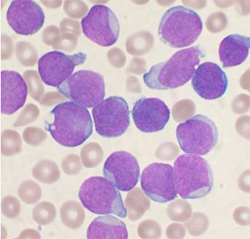Drug that inhibits acute leukemia cell growth discovered
 Washington, Apr 25 : American researchers have found how to turn off a certain receptor that promotes the growth of leukemia cells.
Washington, Apr 25 : American researchers have found how to turn off a certain receptor that promotes the growth of leukemia cells.
The study by researchers from the Children''s Cancer Hospital at The University of Texas M. D. Anderson Cancer Center has been presented in a platform session at the 22nd annual meeting of the American Society of Pediatric Hematology/Oncology (ASPHO).
"There is a certain receptor we now know is expressed in acute myeloid leukemia (AML) cells called Tropomyosin Receptor Kinase A (TRKA)," said Mauricio Ghisoli, M. D., fellow at the Children''s Cancer Hospital at M. D. Anderson.
"When TRKA gets turned on by a nerve growth factor (NGF) ligand, the AML cells start to rapidly grow," the expert added.
Ghisoli and researchers at M. D. Anderson have found that using a TRK inhibitor, AZ23, turns off NGF, which led to a 50 percent reduction of AML cells in mice with no immune system.
When studied in mice with an immune system present, researchers found that 60 percent of the mice treated with AZ23 had long-term survival with no presence of leukemia cells.
They also found AZ23 to be more effective in human AML cell lines that expressed higher levels of TRKA. This pre-clinical discovery could potentially allow clinicians to decipher which patients may have the best response to the drug in the future, explained Ghisoli.
Acute leukemia is the most common cancer in children, according to the American Cancer Society. Acute lymphoblastic leukemia, the more common type, has a cure rate of 80 percent, but children with the rarer type, AML, have only a 50 percent chance of a cure in comparison.
"Young patients with acute lymphocytic leukemia have a great chance of being cured using the standard treatments available out there today," said Patrick Zweidler-McKay, M. D., Ph. D., assistant professor at the Children''s Cancer Hospital and senior investigator.
"However, we have to find alternatives to increase the chance of cure for pediatric patients diagnosed with AML. Understanding how to turn off switches that promote cancer cell production is one way to do this," the researcher said.
In pre-clinical tests on solid tumor cell lines, AZ23 was found effective against the tumors. A Phase I clinical trial is planned to open this year for adults with solid tumor cancers. (ANI)